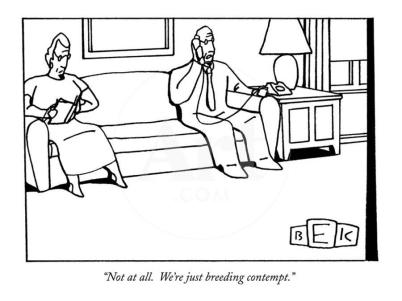
The above cartoon from The New Yorker illustrates an aspect of marriage that John and Julia Gottman, of a marriage institute in Seattle, say is the “single greatest predictor of divorce.” Contempt occurs between people and at the moment is widespread in the political arena. But what sets contempt apart from dislike or anger?
Contempt claims a moral superiority over another. Often it extends beyond a single target to a whole group of people. At the moment it seems that half of Americans are contemptuous of the other half. If the Gottman’s view of divorce applies to nations, we are approaching a civil war. What would it take to pull back from this toxic precipice, whether at home or in the public sphere?
We could start with the simple statement: “you may have a point.” Contempt is much easier. It provides television stations with viewers. You can choose your program to suit your own particular contempt targets. It can be amusing when we watch comedians skewer those we disagree with. It can stroke our egos when we look down on another part of town, another kind of dress, or other people’s habits. Contempt really tempts us because it gives us a chance to feel superior. And feeling superior can feel good.
Instead of saying “how could anyone believe anything that stupid?” (one of my standard expressions) I am going to try a new approach. Why does the person believe that? Is there any merit in their point of view? If there isn’t, can I share another view with the person? Not, clearly, if I go into any conversation with contempt at the ready!

That sounds a good idea, but one I imagine difficult to do in practice. I also am too quick to condemn, when I do take the time to find out why the other person had a differing viewpoint I often find that there is something of merit in it.
LikeLike
I have learned a lot from blogs in other parts of the world. I had a very limited view of Brexit, for instance, until I read diverse views on it.
LikeLiked by 1 person
You have expressed your viewpoint well here, Elizabeth. A lovely post.
LikeLike
Thanks Robbie.
LikeLike
I think you will do well to be able to do that. I don’t know you that well of course, but I have a feeling that if anyone can, it will be you.
Best wishes, Pete.
LikeLike
Thank you for the vote of confidence. I meet my preconceptions daily!
LikeLiked by 1 person
If we all tried, like you, to be open to other’s viewpoints, we might just make progress. Thanks for taking the first step.
LikeLike
Even if just some of us are more open to diversity it would help.
LikeLike
Contempt surely describes public discourse these days. It’s worth the effort to try to tone down the rhetoric and actually listen to one another.
LikeLike
Thanks.
LikeLike
Some people are simply beyond meaningful dialogue. To use an extreme example, can you image Hitler meeting anyone halfway? Neville Chamberlain thought he could appease Hitler and was played for a fool. Are today’s neo-Nazis any more open to conceding that “you may have a point” than the madman they take their inspiration from?
I’m not saying that your contrary next-door neighbor, relative, or co-worker is evil, but I am saying that where we do encounter evil-doing and those who rationalize or condone it, it must be stood up to.
LikeLike
I appreciated your addition to my thoughts. I agree with you about some people. However, I was mostly thinking about regular opinions formed without too much thought by the people around me with whom I may disagree.
LikeLike
I am always hopeful we can make strides. I do think some people are beyond any willingness to talk or listen. Once one person has torn down another, it is hard — not impossible — to come back from. It is easier to stay in our ‘sameness’ but I fear that stunts our growth. Wonderful food for thought.
LikeLike
I agree, but I try not to be one of those unwilling ones.
LikeLiked by 1 person
Me, too.
LikeLike
A preconditioned mindset against the other person?
LikeLike
Exactly.
LikeLiked by 1 person
Good idea and plan Elizabeth
LikeLike
Good idea!
LikeLike
Great post. I’ve been thinking this for a long time.
LikeLike
I can’t add anything except that I think about this a lot. So well written, Elizabeth!
LikeLike
Thanks Des. Glad to have you back in the country.
LikeLiked by 1 person